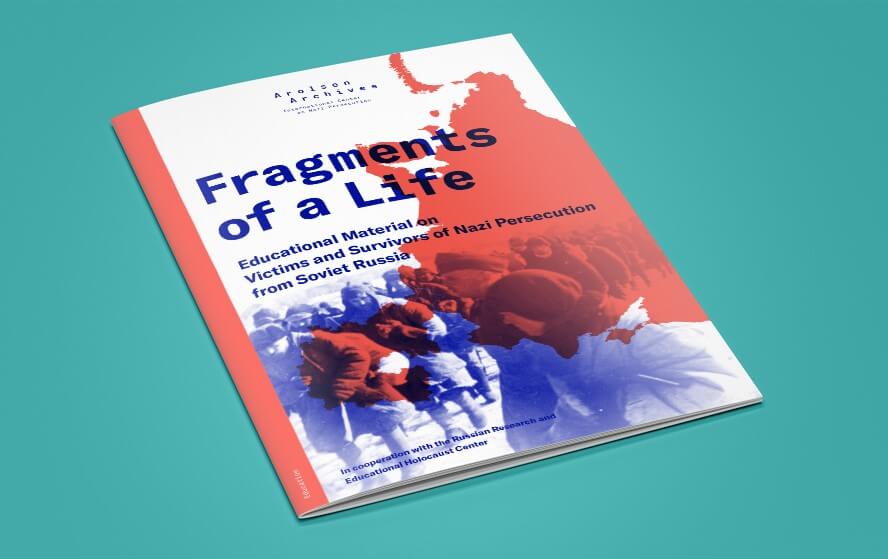Educational material on Nazi persecution in Russia

Teaching resource for history teachers now online in English
The history of Nazi persecution in the Russian part of the Soviet Union is the focus of a new booklet published by the Arolsen Archives. The educational materials feature selected documents on former concentration camp prisoners, forced laborers, and Displaced Persons. Studying the personal fates of people who suffered persecution serves as the starting point for learning about Nazi crimes. The material is suitable for international use in the context of history teaching in schools and also for project work with young people.
The 56-page booklet titled “Fragments of a Life – Educational Material on Victims and Survivors of Nazi Persecution from Soviet Russia” is now available online. It was developed jointly with the Russian Research and Educational Holocaust Center in Moscow. In addition to the English version, a Russian-language version will also be released in the spring. This version will include additional references to Russian-language online resources and a glossary of terms.
In this interview, Henning Borggräfe and Elisabeth Schwabauer from the Arolsen Archives talk about the material, discuss the importance of cooperation in the educational sector, and outline some of their plans for future projects.
The Arolsen Archives are publishing this new educational material in English and, for the first time, in Russian too. Why is this important?
Elisabeth Schwabauer
There’s a huge demand for educational materials of this kind in Russia. The Holocaust has only been part of the curriculum there for about five years, and Nazi forced labor is rarely covered in history classes. So teachers need high-quality materials that cover these topics. However, there’s also a need for educational projects in other learning contexts. Together with our partner organization, we have now developed materials to meet these needs.
Henning Borggräfe
And we’ve included the stories of a number of Displaced Persons. In the Soviet Union, returnees were long subject to a blanket suspicion of having collaborated with the Nazis. Historically and politically speaking, the topic is still quite controversial. The booklet encourages learning groups to find out about it for themselves and to do their own research.

These educational materials have a two-fold purpose: they enable users to prepare teaching units quickly, and they also enable them to work in a project-based setting.
Elisabeth Schwabauer, Educational Specialist
Why was it important to develop the material together with a partner?
Borggräfe
Working on the project together enabled us to engage very productively with different perspectives rooted in different cultural memories. This was an important learning process for everyone involved. Trying to apply approaches used by our institution in the past to another country’s school system just wouldn’t have worked.
Schwabauer
Cooperating with our partner in Moscow also gave us a much better picture of the knowledge levels of the target groups we want to address, and that enabled us to adapt both the content and the methods appropriately. These educational materials have a two-fold purpose: they enable users to prepare teaching units quickly, and they also enable them to work in a project-based setting. So it’s very important that we have the right mix. I should also mention that our partner has an excellent network with over 34 regional branches in Russia and other successor states of the Soviet Union, connections to universities, and contacts to the school system. This increases the efficiency of what we are doing enormously, and that’s something we’re very grateful for.
How does this new material differ from existing didactic approaches?
Borggräfe
We’re using original documents from our archival holdings and the life stories of real people as the starting point for exploring the topic. So we’re giving students the opportunity to work with source materials that don’t normally appear in school books. Archival material offers many more possibilities than the historical newspaper articles, speeches by famous people, or caricatures that you often find in textbooks. Our approach is much more direct; there is more to discover, more to find out, more to interpret.

We’re using original documents from our archival holdings and the life stories of real people as the starting point for exploring the topic.
Dr. Henning Borggräfe, Head of Research and Education
The booklet uses the words “archival pedagogy” to describe this approach.
Borggräfe
That’s right. We encourage and enable learning groups to base their research on a critical study of the sources and embark upon their very own educational “voyage of discovery.” By the way, one of the things we hope young people will take away is the understanding that the information we have about the fates of Nazi victims is often incomplete and sometimes contradictory. That demonstrates that history isn’t just lying around waiting for us to pick it up. We need to reconstruct historical developments and circumstances first, and to do that, we have to interpret the sources. It’s all about putting more focus on the victims of National Socialism too, that’s another important part of what we’re doing.
Schwabauer
Archival pedagogy also encourages further research – in the online archive of the Arolsen Archives, for example, or in local archives – and the use of tools like our e-Guide, which will soon also be available in Russian, by the way. So students don’t just learn historical facts, they also develop new skills in the area of research. This is quite new territory in educational work in Russia, and we’re really pleased that we were able to work together with a local partner and can now offer teachers appropriate resources.
The booklet is the first part of a new international series. What else is in the pipeline?
Borggräfe
Up until now, our educational materials were primarily intended for the German-speaking world. Now we want to broaden our reach. All the publications in the new series will be published in two languages: in English and in the language of a partner organization. The focus will always be on documents from the Arolsen Archives, on documents related to specific victim groups or specific countries, for example. We prepare the material very thoroughly so it’s ready for immediate use and doesn’t call for time-consuming preparations. This is important because we’re explicitly targeting learning groups in out-of-school contexts. We’re planning our next publication with Borussia Dortmund football club. The idea is to give fans and other people who are interested in the topic the opportunity to hear about how football players from different European countries were persecuted by the Nazis and to find out more about the topic.
Historian Dr. Henning Borggräfe is Head of Research and Education at the Arolsen Archives. Elisabeth Schwabauer is an educational specialist in the same department.

